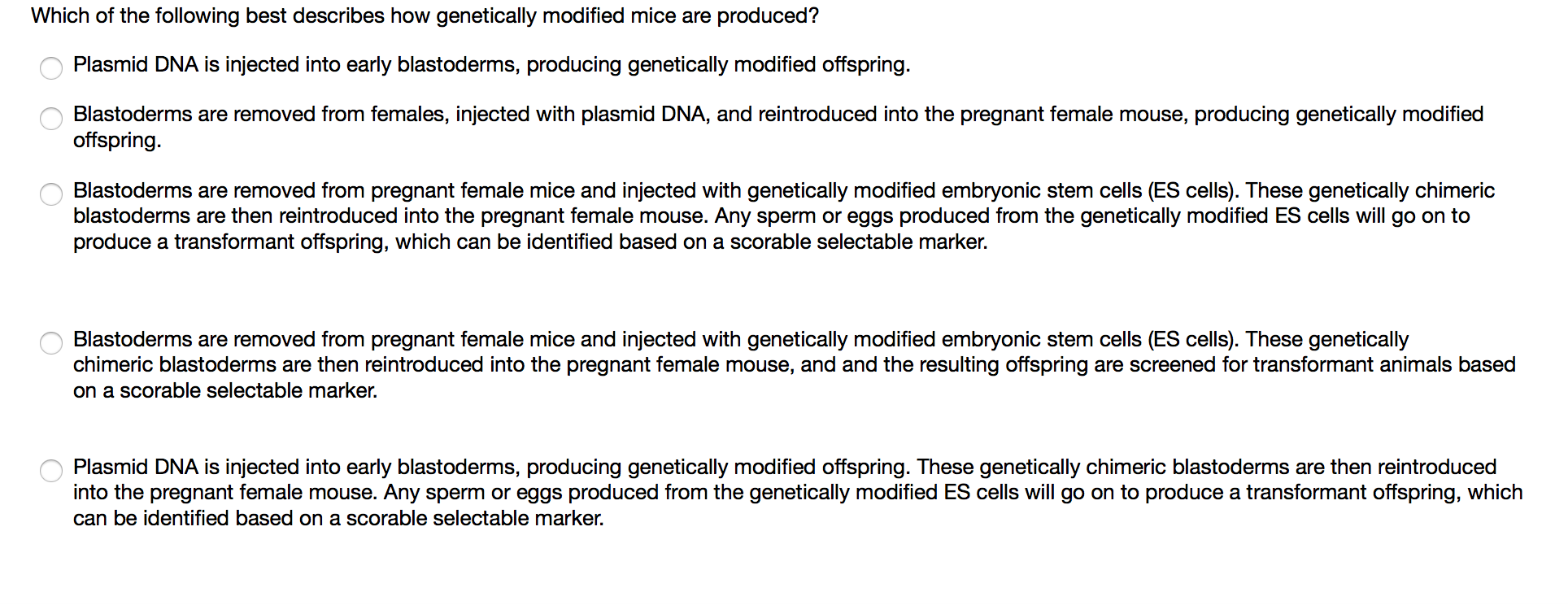Question: Which of the following best describes how genetically modified mice are produced? Plasmid DNA is…

Show transcribed image text Which of the following best describes how genetically modified mice are produced? Plasmid DNA is injected into early blastoderms, producing genetically modified offspring. Blastoderms are removed from females, injected with plasmid DNA, and reintroduced into the pregnant female mouse, producing genetically modified offspring. Blastoderms are removed from pregnant female mice and injected with genetically modified embryonic stem cells (ES cells). These genetically chimeric blastoderms are then reintroduced into the pregnant female mouse. Any sperm or eggs produced from the genetically modified ES cells will go on to produce a transformant offspring, which can be identified based on a scorable selectable marker. Blastoderms are removed from pregnant female mice and injected with genetically modified embryonic stem cells (ES cells). These genetically chimeric blastoderms are then reintroduced into the pregnant female mouse, and and the resulting offspring are screened for transformant animals based on a scorable selectable marker. Plasmid DNA is injected into early blastoderms, producing genetically modified offspring. These genetically chimeric blastoderms are then reintroduced into the pregnant female mouse. Any sperm or eggs produced from the genetically modified ES cells will go on to produce a transformant offspring, which can be identified based on a scorable selectable marker.
Which of the following best describes how genetically modified mice are produced? Plasmid DNA is injected into early blastoderms, producing genetically modified offspring. Blastoderms are removed from females, injected with plasmid DNA, and reintroduced into the pregnant female mouse, producing genetically modified offspring. Blastoderms are removed from pregnant female mice and injected with genetically modified embryonic stem cells (ES cells). These genetically chimeric blastoderms are then reintroduced into the pregnant female mouse. Any sperm or eggs produced from the genetically modified ES cells will go on to produce a transformant offspring, which can be identified based on a scorable selectable marker. Blastoderms are removed from pregnant female mice and injected with genetically modified embryonic stem cells (ES cells). These genetically chimeric blastoderms are then reintroduced into the pregnant female mouse, and and the resulting offspring are screened for transformant animals based on a scorable selectable marker. Plasmid DNA is injected into early blastoderms, producing genetically modified offspring. These genetically chimeric blastoderms are then reintroduced into the pregnant female mouse. Any sperm or eggs produced from the genetically modified ES cells will go on to produce a transformant offspring, which can be identified based on a scorable selectable marker.



